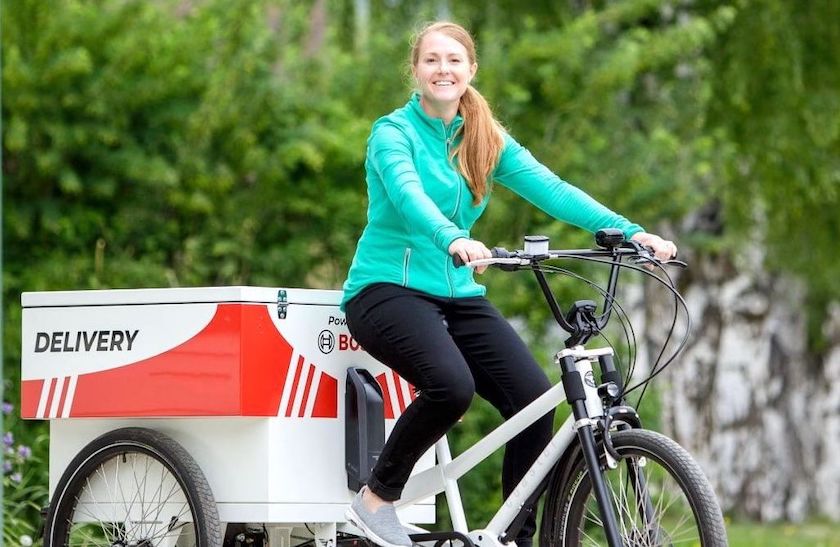
• Flip Book • eNews • eAdventures • eCities • eCargoIntl • eBikeTypes • eRoad • eMTB • eUrban • eCargo • eBikeTests • eAccessories • eFactoryTours • eFeatures •

• Flip Book • eNews • eAdventures • eCities • eCargoIntl • eBikeTypes • eRoad • eMTB • eUrban • eCargo • eBikeTests • eAccessories • eFactoryTours • eFeatures •
May 7, 2024 - The logistics and transportation sectors worldwide are evolving at a record pace. Easing congestion and fighting climate change, e-cargo bikes are rapidly emerging as the silver bullet for much-needed green, economical solutions for inner-city, last-mile deliveries. Sales of cargo bikes and e-cargo bikes have been soaring in tandem with e-bikes, the most popular electric vehicle worldwide. The market volume for e-bikes is roughly 200 million units vs 20 million electric cars.
Study after study demonstrates that e-cargo bikes outpace conventional delivery vans, and major industry players are taking notice.
According to the Urban Freight Lab at the University of Washington, e-cargo bikes are more affordable with ownership costs at about 40% of a conventional delivery van. They’re also zero-emission with an estimated total social and environmental cost of 12% of a diesel van and 14% of an electric van.
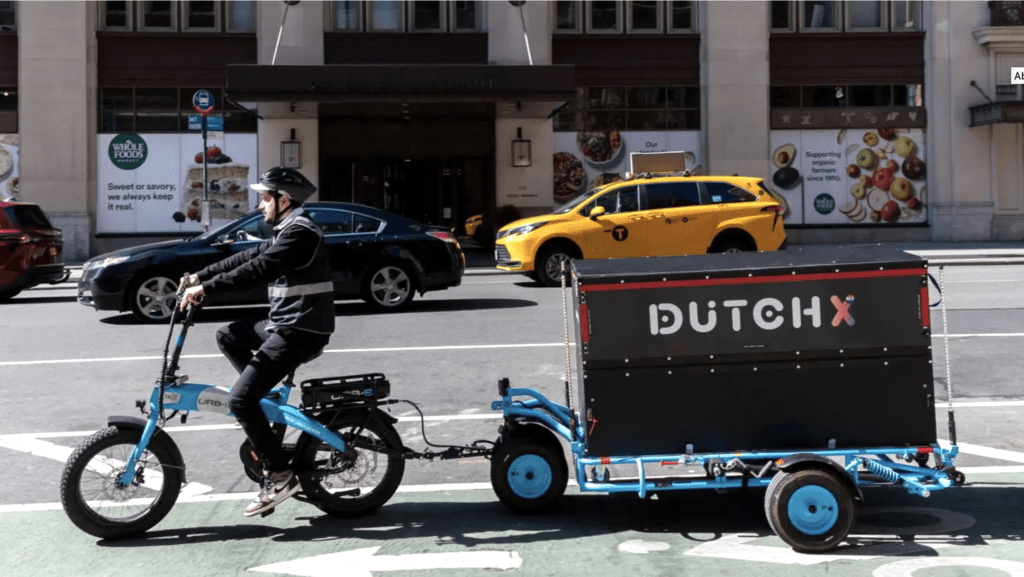
Global players such as DHL and Schenker have been actively growing their green operations. More heavyweights, such as FedEx, UPS and Purolator, are now on board as the list keeps growing.
Large institutional delivery entities like Deutsche Post and Post NL have been using e-cargo bikes and e-trikes since 2014 and 2016 respectively. Both US Post and Canada Post are running pilot programs for e-cargo bike deliveries.
Along the way, countless start-ups such as Pedal Me and Zedify in the UK, Cargoroo e-cargo bike sharing in Holland with more than 1,200 units in nine European cities, and retail multinational giants like IKEA have signed on.
Notably, the e-cargo bike movement is rapidly spreading around the world including Africa, where Wahu and SHOVeBike were recently founded.
According to Europe’s City Changer Cargo Bike (CCCB) Manufacturers and Operators with 22 partners, the average number of e-cargo bikes in European fleets has quadrupled since 2019, and annual sales in Europe are projected to reach 400-500,000 units.
The recent adoption of the landmark inter-institutional European Cycling Declaration in April marked a historic milestone, as cycling now has a seat at the EU transportation table. The declaration is the most ambitious EU-level policy initiative to date, and it recognizes cycling as a strategic priority and acknowledges its power to generate enormous benefits for Europe.
In North America, operators welcomed another recent historic development as New York City’s Department of Transportation (DOT) made a major cargo-bike announcement, allowing longer bike-trailer combinations up to 192” with trailer (previously 120”), and the use of four-wheeled van-like cargo bikes up to 48” wide (previously 36”).
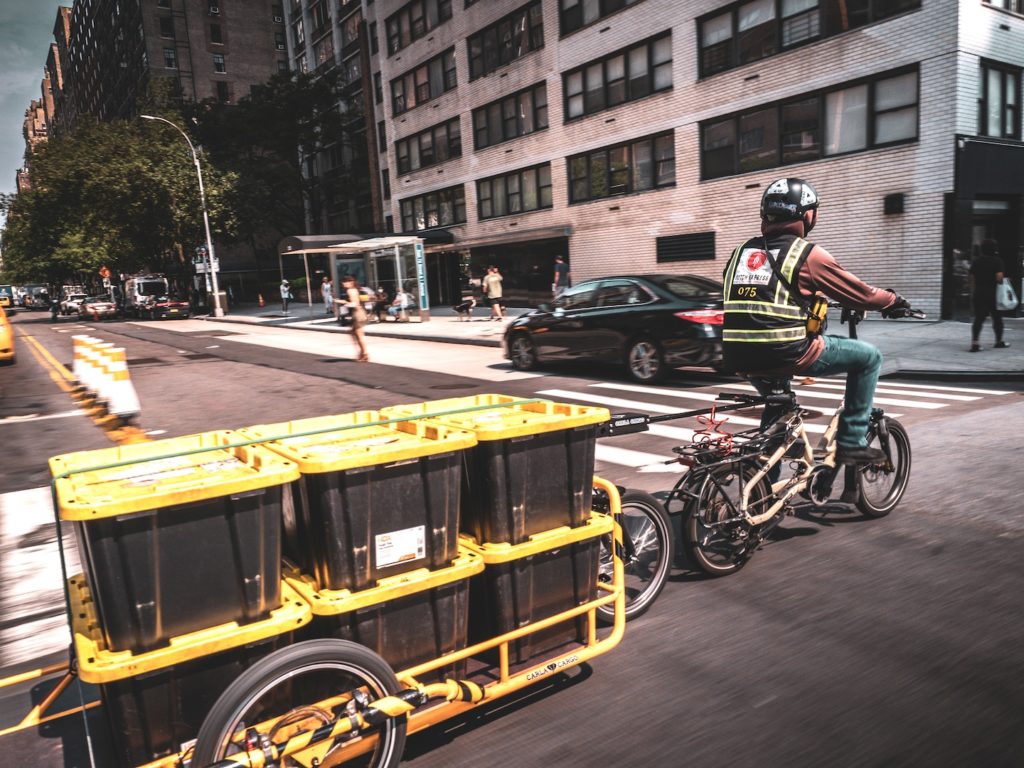
This remarkable victory for sustainable green delivery operations could unleash a true cargo-bike revolution. NYC DOT clearly listened to industry leaders, noting that it “…made several adjustments to draft rules proposed last year based on feedback received during the public comment period.”
NYC-based DutchX, founded in 2012, has rapidly become an industry leader. Their clients include some of the largest retailers in the world such as Amazon, Club Monaco and Whole Foods.
Co-founders Ariella Azogui and Marcus Hoed combined their unique knowledge of gaps in the retail delivery space, along with complex logistics operations, to become pioneers in the same-day and next-day delivery markets.
Their innovative, proprietary software, Zadar, manages DutchX’s 100% employee-based delivery workforce and complex urban logistics operations. Zadar recently won a Top Software & Tech Award by Food Logistics and Supply & Demand Chain Executive.
“This ground-breaking NYC DOT news signals a new era that’s poised to revolutionize the micromobile delivery space. DutchX has proactively acquired several electric quadricycles (or “eQuads”) to integrate into our zero-emission fleet as they offer unparalleled versatility in urban delivery. We’re also looking to further expand our fleet to include electric refrigerated box trucks. This exciting news aligns with our sustainability goals and is a significant step towards revolutionizing our operations to lead the way in sustainable logistics,” commented DutchX.
Tern Bicycles, with offices around the world, launched Tern Business in 2018 and targeted its compact utility GSD e-cargo bike to help businesses carry more and do more. Seeing steady growth, the company re-launched its Bikes for Business campaign in 2021 and has never looked back.
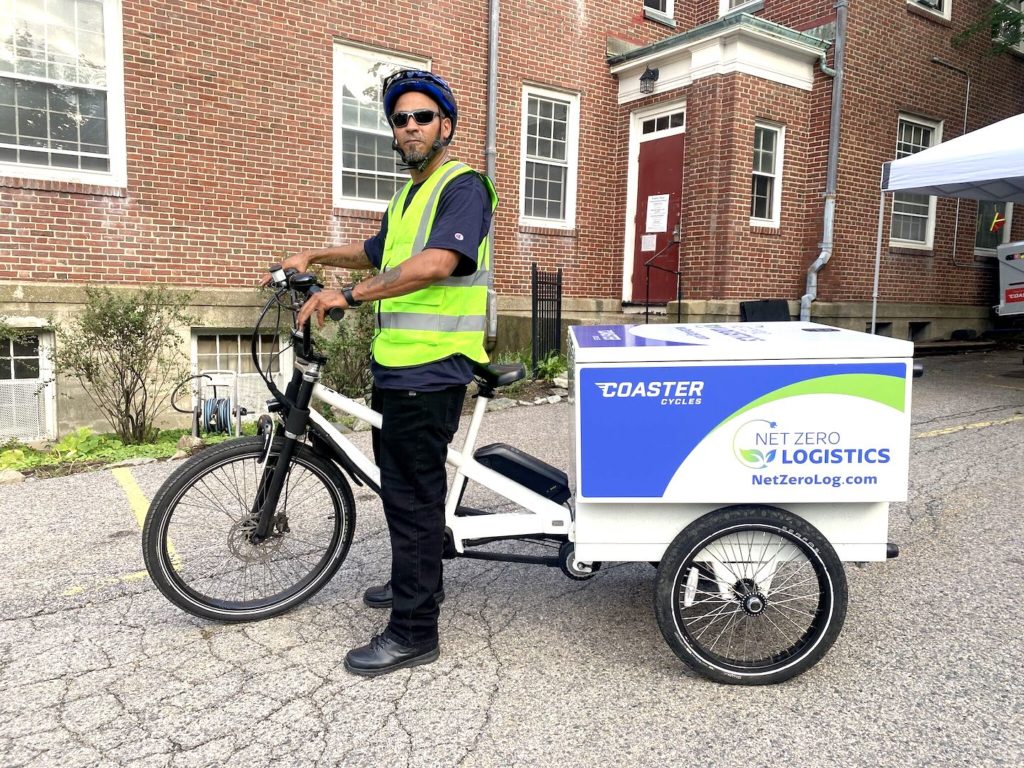
“We applaud NYC for taking input from operators into consideration and adjusting their policy accordingly, and we’re very happy with our partnership with DutchX and Cornucopia in NY.
Both have very impressive operations in a very difficult working environment, which is a great test of the benefits of e-bikes in logistics service in an urban setting. If e-bikes can succeed in NY then they have a great chance all over the world,” commented Steve Boyd, North American General Manager at Tern Bicycles.
That sentiment was echoed by entrepreneur Ben Morris, CEO of Coaster Cycles and Boston Pedicabs, who noted, “DOT did a nice job of balancing public and private interests.”
Based in Montana, innovative Coaster Cycles offers four models of e-trikes that range from the Venture to the Freighter AW. Coaster supplies e-trikes to Net Zero Logistics as part of the new Boston Delivers initiative, an e-cargo bike delivery pilot program. Their Boston Pedicab operations, launched in 2005, have expanded into San Francisco, Washington, Portland, Chicago, Austin, Santa Monica and more cities.
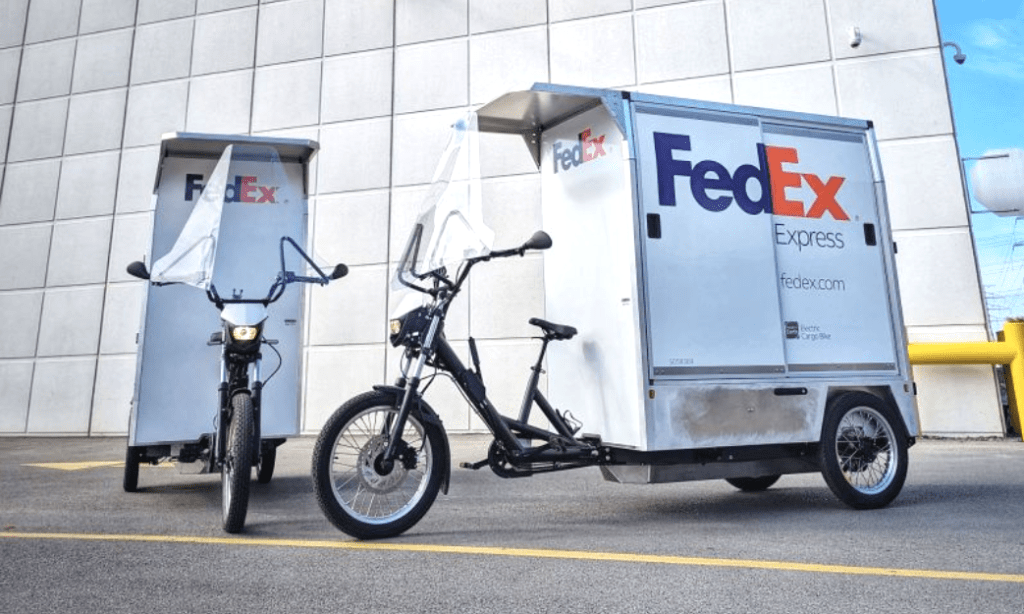
In Canada, heads turned last October when FedEx Canada added Fulpra’s Roll 3000L models to its electric vehicle fleet via the Dutch company’s Canadian distributor, Allo Velo Inc., based in Montréal. FedEx first tested deliveries with Bullitt e-cargo bikes in mid-2020 as it continues to expand its e-vehicle footprint in Canada and around the globe.
According to the owner of Allo Velo Inc., Lamar Timmins, the business community is showing more interest in their last-mile solutions, but it’s a slow process as the products are new. “We need more incentives for businesses to invest in these types of vehicles to assist in the conversion process,” said Timmins.
In 2021, Purolator became the first Canadian courier company to roll out its green fleet program nationally with both electric delivery trucks and e-cargo bikes. Starting in Vancouver, the program is now in four major cities including Montréal, Toronto and Ottawa.
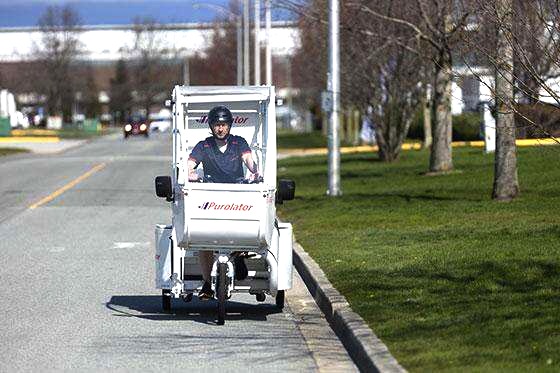
Montréal, a leader in progressive cycling strategy and advocacy, launched its innovative Colibri e-cargo bike last- mile services project back in 2019 with partners like Purolator.
The new initiative, with a central urban warehouse mini- hub for sorting packages for last-mile delivery by a fleet of e-cargo bikes, was immediately successful, seeing a 15% increase reaching over 4,000 deliveries per week.
But plans to open additional mini-hubs hit some roadblocks as volumes dropped in 2022, and the City stalled its ambitions until regulations are in place to monitor van deliveries. Also, the mini-hub will close at the beginning of 2025 for a few years, as its current site will undergo a planned transformation.
Toronto’s NRBI (Near By), launched in 2021 by two local entrepreneurs, also saw immediate success creating a mini sensation for e-cargo bike delivery services with their aquamarine-coloured Babboe Pro Trike Centaurs and black Triobike Cargo Big units.
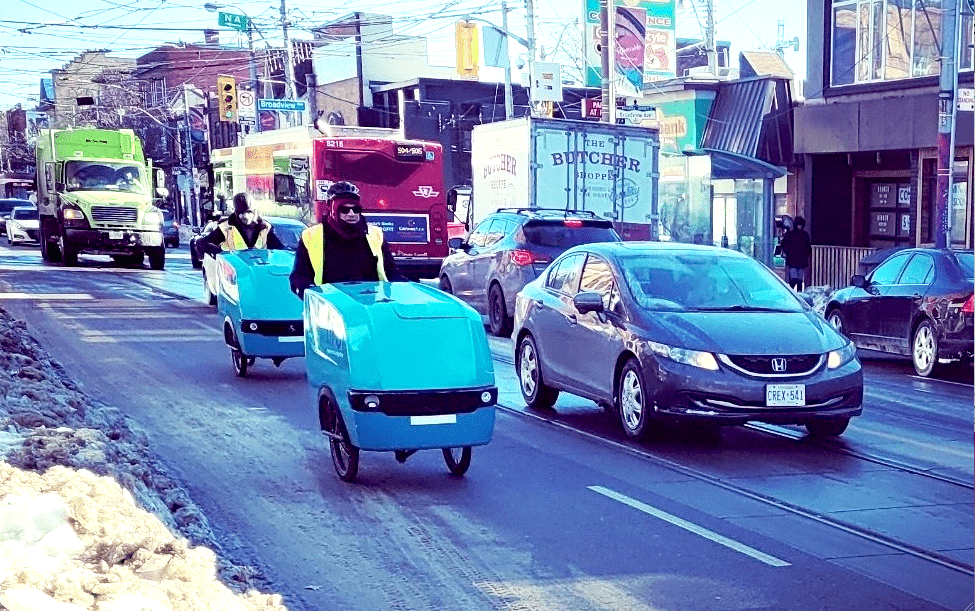
Fast forward to today and the company has expanded into Vancouver and recently tweeted, “Over 105,000 packages have been delivered in Toronto and Vancouver in 2023. By choosing cargo bikes, we have collectively saved 14.5 metric tons of CO2 emissions!”
Vancouver’s Shift Delivery, a worker-owned co-operative, celebrated its 10th anniversary in 2021 as a pioneer of sustainable last-mile e-trike inner-city deliveries. Co-owner Sandra Allen wishes parts were more readily available in North America, noting that green deliveries continue to gain traction but not fast enough “…for us trailblazers. We would also like to see more support and incentives from governments… policy is where a lot of real change happens to truly promote and support city-friendly, green options,” she commented.
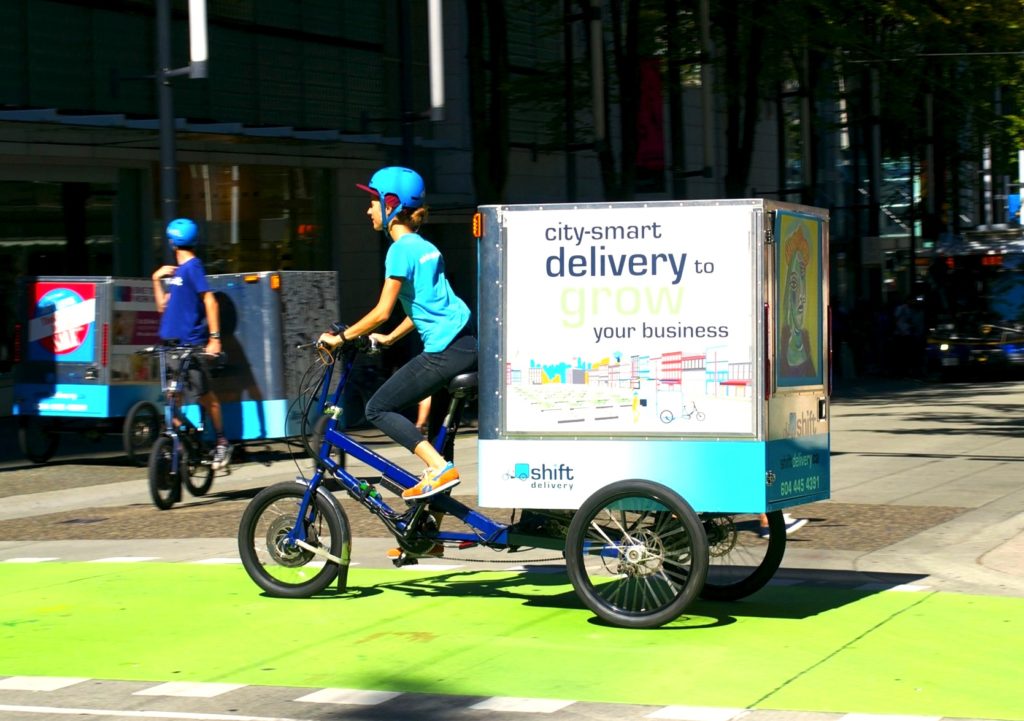
The playing field for sustainable e-solutions continues to grow, and there are many more notable operators such as B-Line Sustainable Urban Delivery in Portland, Llama (formerly URB-E) in New York City, Penguin Pickup in Toronto and Vancouver, Zygg E-Bikes also in both cities, Innovobot in Vancouver, and La roue libre in Montréal.
Last fall, many of these companies attended the North American Cargo Bike Conference (NACBC) held during the Fully Charged LIVE Canada event at the Vancouver Convention Centre.
Plans for this year’s conference have yet to be released. However, Europe’s industry-leading International Cargo Bike Festival (ICBF) announced that it will be staged in Utrecht from Oct. 25-26 in conjunction with Dutch Cycling Week.
The ICBF boldly declared the 2020s as the #decadeofthecargobike!” which is ringing true as global interest in e-cargo bikes is exploding to answer the call for better, safer and greener options for public and commercial interests.
While Europe is undoubtedly leading the charge, the North American appetite for e-cargo bike solutions is rapidly gaining traction as more and more companies are delivering quality solutions. Forward-thinking cities, municipalities, politicians and governments are listening.